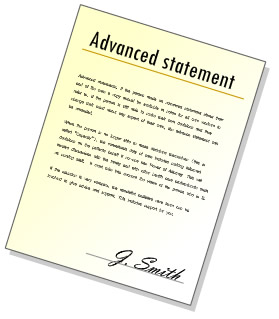
Advanced statements. An Advanced Statement is a document which sets out the persons wishes should they become unable to make decisions for themselves at the end of their life. It has to be completed and signed while the person is well and still able to make informed choices. For some people this is very important and they may have held strong views and opinions about in which circumstances they would not wish to prolong their life. If the person made an advanced statement about their end of life care a copy should be available in notes for all care workers to refer to. However in Scottish law an advanced statement is still not a legally binding document but it does indicate to health professionals what the persons expressed wishes are if such a situation arises. If the person is still able to make their own decisions and they change their mind about any aspect of their care, the advance statement can be amended.
When the person is no longer able to make decisions themselves (this is called “Capacity”), the consultants duty of care includes making informed decisions on the patients behalf if no-one has Welfare Power of Attorney. This will involve discussions with the family and with other health care professionals such as nursing staff. It should take into account the views of the person who is ill if these views were known before their illness.
If the situation is very complex, the specialist palliative care team can be involved to give advice and support. The palliative care team are the experts in end of life care and management of the dying patient. They are also sensitive to the needs of the carers and families and can offer support for you.